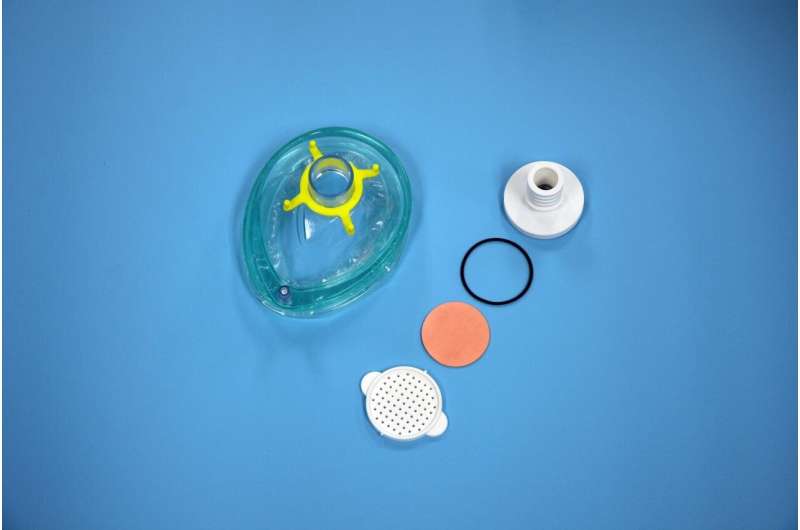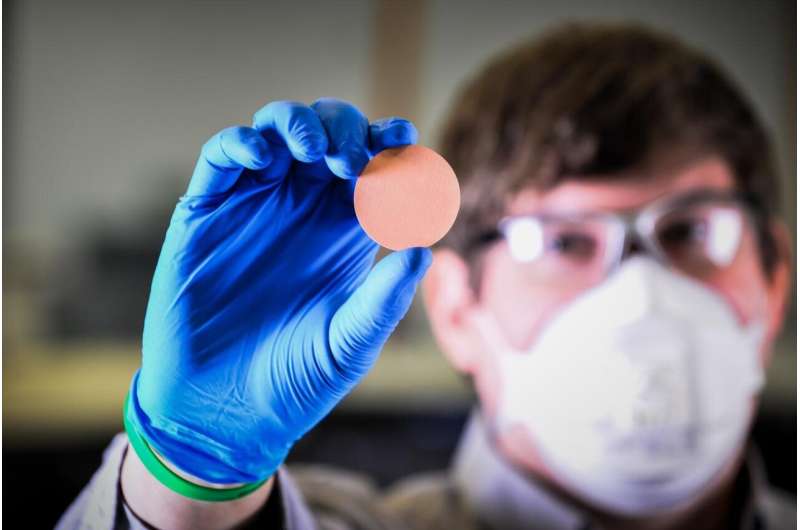ExOne, Pitt collaborate to produce reusable respirators with 3-D printed metal filters

The ExOne Company and the University of Pittsburgh have partnered to develop reusable metal filters that fit into a specially designed respirator cartridge for sustainable, long-term protection against contaminants, such as COVID-19.
ExOne's binder jetting technology is a high-speed form of 3-D printing that can produce metal parts with specific porosity levels that can effectively filter out contaminants while allowing airflow.
ExOne has 3-D printed respirator filters in two metals—copper and 316L stainless steel—and a range of porosity levels for use inside a unique cartridge designed by the Mechanical Engineering & Materials Science department in Pitt's Swanson School of Engineering. Initial testing for airflow and filtration efficiency is currently underway, and the filters are being optimized with the goal of adhering to an N95 respirator standard.
"Our team has been working urgently to expedite this promising and reusable solution for medical personnel on the frontlines of fighting the COVID-19 pandemic," said John Hartner, ExOne CEO. "Our customers routinely print porous metal filters for a variety of purposes, and we are confident that we'll have a solution soon that can enable medical personnel to sterilize metal filters for repeated reuse, eliminating waste. Once approved, we can print these filters in a variety of sizes for respirators, ventilators, anesthesia masks or other equipment."ExOne 3-D printed a reusable, sterilizable copper filter to fit inside a cartridge designed and 3-D printed by Pitt. Theset is undergoing testing and is being optimized with the goal of adhering to an N95 standard. Once complete, the filter can be printed to fit inside respirators, ventilators, anesthesia masks or other equipment.

"The advantage of binder jet 3-D printing over other additive manufacturing methods for this filter application is the ability to utilize the porosity of the printed part and then fine tune it during the high temperature densification or sintering process to achieve optimum filtering and airflow performance," said Markus Chmielus, Associate Professor of Mechanical Engineering and Materials Science at the Swanson School.
3-D Printed Metal Filter Project Details
ExOne's binder jetting technology uses an industrial printhead to selectively deposit a liquid binder onto a thin layer of powdered material, layer by layer, until a final object is formed. After 3-D printing powdered metals, the object is then sintered in a furnace to dial in a specific level of porosity. While binder jetted metal is typically sintered to full density, some applications require a specific level of porosity, such as filters.
To test filters in different metals and porosities, Dr. Chmielus' research group is using CT scanners to analyze the microstructure and porosity of the filters. Ansys, the global leader in engineering simulation, also based near Pittsburgh, is providing additional computer simulation support to analyze and optimize the performance of the filters.
While copper and stainless steel filters are currently being tested, copper has been known to have antibacterial properties since ancient times. The first recorded use of copper to kill germs was in the Edwin Smith Papyrus, the oldest known medical document in history, according to the Smithsonian. Many studies have proven copper's disinfectant powers. One landmark 2015 study, funded by the Department of Defense, revealed that copper alloys contributed to a 58% reduction in infections. COVID-19 research also suggests the virus dies faster on copper than on other surfaces.



















